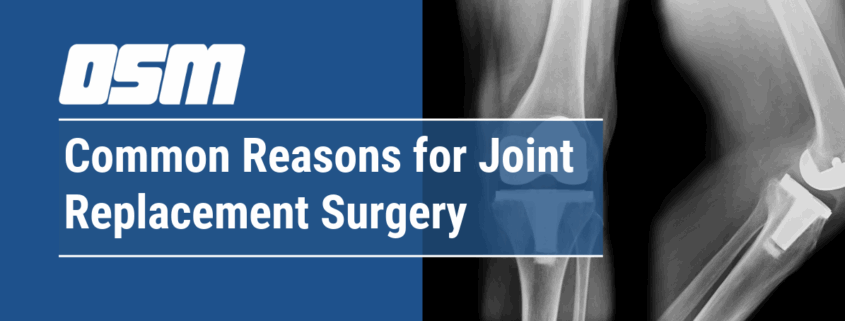Common Reasons for Joint Replacement Surgery
Article featured on Raleigh Orthopedic
What is Total Joint Replacement?
Total joint replacement is a commonly performed surgical procedure in which arthritic or damaged joints are replaced with prosthetic components to restore the function of the joint. The prosthetic device is made of metal, plastic, or ceramic. The goal of joint replacement is to relieve pain and make it possible to perform daily activities more easily.
Total joint replacement is only considered when you have tried and failed more conservative treatments, yet continue to have significant pain, stiffness, or problems with the function of your joint – often the hip or knee. If nonsurgical means, such as lifestyle changes, physical therapy, and mobility aids are no longer helpful, joint replacement surgery may be the next option to consider.
Common Causes Leading to Joint Replacement
The most common cause of joint replacement is arthritis. Osteoarthritis, rheumatoid arthritis, osteonecrosis, and post-traumatic arthritis are the most common forms of this disease.
- Osteoarthritis (OA): Also known as the wear-and-tear form of arthritis, is a degenerative joint disease. This chronic condition occurs as a result of changes or damage to the cartilage that cushions joints, resulting in stiffness, pain, swelling, and limited joint function. Joint trauma, obesity, repeated stress on the joint, bone deformities, and metabolic diseases are often responsible for cartilage damage, leading to further deterioration of the joint. Joint replacement surgery is often recommended in the final stages of osteoarthritis, when mobility and quality of life are significantly impacted.
- Rheumatoid Arthritis (RA): An autoimmune disease in which the body’s immune system attacks the joints. The tissues that line the inside of joints become inflamed from the immune cells, causing swelling and pain around the affected joints. Reduced joint function, joint instability, joint deformity, pain, stiffness, and mobility issues are common symptoms of RA. In advanced RA cases, where joint cartilage has severely deteriorated, your orthopedic specialist may recommend joint replacement surgery.
- Osteonecrosis: An injury to the joint, such as a fracture or dislocation, may limit blood supply to certain areas of the bone. The lack of blood supply may cause the surface of the bone to collapse, and arthritis will develop as a result. The most commonly affected areas are the femoral head (part of the hip joint), knee, and shoulder.
- Post-Traumatic Arthritis: Inflammation in the joint that occurs after an injury. This type of arthritis develops quickly, rather than over an extended period of time. Symptoms include stiffness, swelling, and pain in the affected joints. For some individuals, post-traumatic arthritis is a temporary issue that is managed by lifestyle changes and exercise. For others, the symptoms may be more severe – resulting in a chronic condition that requires joint replacement surgery to relieve pain and restore joint function.
The Orthopedic & Sports Medicine Center of Oregon is an award-winning, board-certified orthopedic group located in downtown Portland Oregon. We utilize both surgical and nonsurgical means to treat musculoskeletal trauma, spine diseases, foot and ankle conditions, sports injuries, degenerative diseases, infections, tumors and congenital disorders.
Our mission is to return our patients back to pain-free mobility and full strength as quickly and painlessly as possible using both surgical and non-surgical orthopedic procedures.
Our expert physicians provide leading-edge, comprehensive care in the diagnosis and treatment of orthopedic conditions, including total joint replacement and sports medicine. We apply the latest state-of-the-art techniques in order to return our patients to their active lifestyle.
If you’re looking for compassionate, expert orthopedic and podiatric surgeons in Portland Oregon, contact OSM today.
Phone:
503-224-8399
Address
17355 Lower Boones Ferry Rd Suite 100A
Lake Oswego, OR 97035
Hours
Monday–Friday
8:00am – 4:30pm



